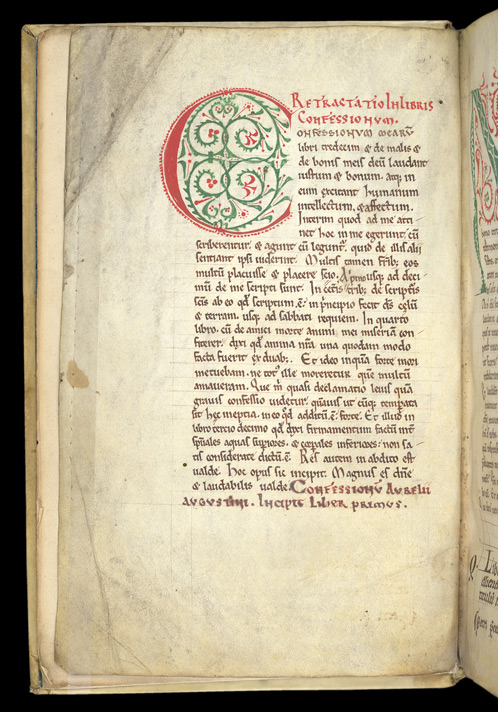St. Augustine,
The Confessions, (circa 397 CE)

|
|
Puritan theology was an effort to externalize and systematize this [St. Augustine's] subjective mood.
Piety was the inspiration for Puritan heroism and the impetus in the charge of Puritan Ironsides; it
also made sharp the edge of Puritan cruelty and justified the Puritan in his persecution of disagreement.
It inspired Puritan idealism and encouraged Puritan snobbery. It was something that men either had or
not, it could not be taught or acquired. It was foolishness and fanaticism to their opponents, but to
themselves it was life eternal."
Perry Miller, The New England Mind: The Seventeenth Century
(1939: Cambridge: Harvard University Press, 1982), 5.
But how did you speak? Did you speak as you did when your voice was heard in the clouds saying,
"This is my beloved son?" At that time your voice sounded and then ceased. It was speech
with a beginning and an end. Each syllable could be heard and then died away, the second
following after the first and the third after the second, and so on in sequence until the
last syllable followed all the rest and than gave place to silence. From this it is
abundantly clear that your speech was expressed through the motion of some created thing,
because it was motion subject to the laws of time, although it served your eternal will.
These words, which you had caused to sound in time, were reported by the bodily ear of
the hearer to the mind, which has intelligence and inward hearing responsive to your
eternal word. The mind compared these words, which it hear sounding in time, with your Word,
which is silent and eternal and said, "God's eternal Word is far far different from these
words that sound in time." They are far beneath me; in fact they are not at all, because
they die away and are lost. But the Word of God is above me and endures forever. (Book 10, No. 6)
|
A fickle-minded man, whose thoughts were all astray because of his conception of time past, might wonder why you, who are God almighty, Creator of all, Sustainer of all, and Maker of heaven and earth, should have been idle and allowed countless ages to elapse before you finally undertook the vast work of creation. My advice to such people is to shake off their dreams and think carefully, because their wonder is based on a misconception.
How could those countless ages have elapsed when you, the creator, in whom all ages have their origin, had not yet created them? What time could there have been that was not created by you? How could time elapse if it never was?
You are the Maker of all time. If, then, there was any time before you made heaven and earth, how can anyone say that you were idle? You must have made that time, for time could not elapse before you made it.
But if there was not time before heaven and earth were created, how can anyone ask what you were doing "then"? If there was not time, there was no "then." Furthermore, although you are before time, it is not in time that you precede it. If this were so, you would not be before all time. It is in eternity, which is supreme over time because it is a never-ending present, that you are at once before all past time and after all future time. For what is now the future, once it comes, will become the past, whereas you are unchanging, your years can never fail. Your years neither go nor come, but our years pass and others come after them, so that they all may come in their turn. Your years are completely present to you all at once, because they are at a permanent standstill. They do not move on, forced to give way before the advance of others, because they never pass at all. But our years will all be complete only when they have all moved into the past. Your years are one day, yet your day does not come daily but is always today, because your today does not give place to any tomorrow nor does it take the place of any yesterday. Your today is eternity. And this is how the Son, to whom you said I have begotten you this day, was begotten co-eternal with yourself. You made all time; and the "time", if such we call it, when there was no time was not time at all. (Book 11, no. 13)
|